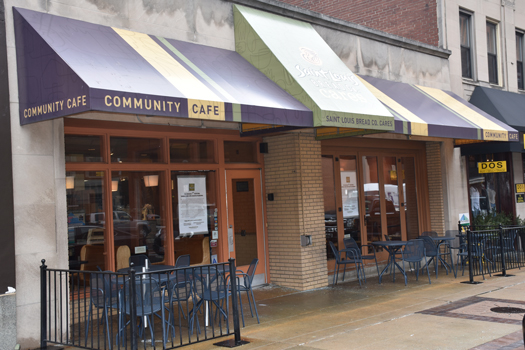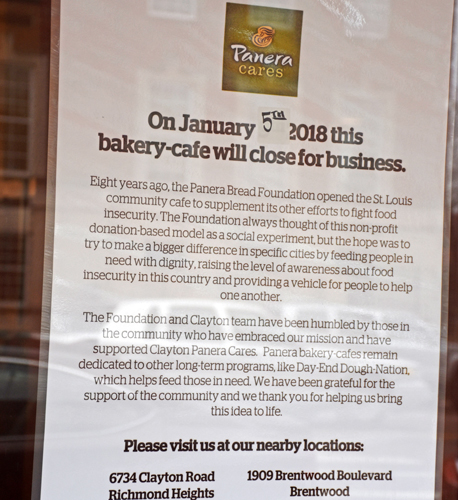St. Louis-based ‘pay what you can’ eatery closes
By J.A. Salaam -Staff Writer- | Last updated: Jan 17, 2018 - 1:13:50 PMWhat's your opinion on this article?

|
ST. LOUIS—A pay-as-you-go restaurant in the St. Louis area that permitted customers to pay what they wanted for meals, recently closed its doors. Known as an American bakery-café fast casual restaurant, the St. Louis Bread Company, was founded in 1981 in the suburbs of Kirkwood, Missouri. The name was changed to Panera in 1997, when it was bought by Au Bon Pain café’s founder Ron Shaich. Pronounced ‘Pan Era’ the root name means ‘bread basket’ in Latin. The chain has grown to over 2,100 stores in the United States and Canada.
The St. Louis-based café opened a unique concept of “pay-what-you-can” locations in 2010 in an existing St. Louis Bread, Co. restaurant in the affluent business district of Clayton, Missouri.
According to Mr. Shaich, the economics of keeping the location open “did not make sense,” reported the St. Louis Post-Dispatch. The store closed Jan. 5.
The café was considered a perfect location because it was surrounded by county government buildings and other businesses with employees that could afford to pay the suggested price or more. The concept is that that would then compensate for those who could only afford to pay a portion or nothing at all.
Unfortunately, after seven years the store had to close its doors. There were people walking by pulling on the door days after its closing not knowing the café was no longer there.

|
“People were coming out here and people that worked out here. People didn’t pay what they were supposed to pay. I literally watched someone get sandwiches, and salads enough to feed a group and only drop two dollars in. I said wow, really? I couldn’t believe it and that happened so much there. And no it wasn’t because of the lease either why they closed. It was because people got greedy and was selfish,” said Cynthia Hines. She works in the area and was also a frequent patron of the restaurant.
The Bread Company has committed itself to giving back to the community. At the close of each business day, employees count all the baked goods and donate it to non-profit organizations.
Tina A. Dews, owner of DOS Resale Boutique next door to the former Panera Cares café said it was sad that it was now closed.
“It was a great thing when it started for people less fortunate. But the county workers whom could afford to pay full price, that get nice checks, they took advantage of it, like putting a dollar in for a $10 hot meal. They ruin a good thing,” said Ms. Dews.
Kevin Wilson agreed. “It was a good concept, but it got to a point that customers just didn’t want to do right, especially when people would pay as little as possible when they could afford to pay more,” said Mr. Wilson, a former employee at the location.
“The store was a true charitable place, I mean like it gave people who couldn’t work anywhere else a chance to work. There was people with disabilities and homeless people that worked in exchange for a meal. It was wrong how people treated it,” he added.
Since it’s opening the St. Louis location served “probably a half-million meals through this cafe, all at no set prices, as a gift to the community,” Mr. Shaich said in a phone interview with the St. Louis Post-Dispatch. He said customers paid, on average, about 85 percent of the suggested price, proving, he said, “that people are fundamentally good.”
“What did people expect to happen? When the electric, gas and bills had to be paid, plus salaries, food supplies and the rent too had to be paid. No business could stay open when more money was spent than what was coming in,” said Mr. Wilson.
“I really liked working there and will miss the different people who came in and working with those with special needs, there was nothing like it, people should be more thoughtful,” concluded Mr. Wilson
The company opened similar cafes in Chicago; Dearborn, Mich.; Portland and Boston. Only the Boston location remains open. (The Associated Press contributed to this report.)
INSIDE STORIES AND REVIEWS
-
-
About Harriett ... and the Negro Hollywood Road Show
By Rabiah Muhammad, Guest Columnist » Full Story -
Skepticism greets Jay-Z, NFL talk of inspiring change
By Bryan 18X Crawford and Richard B. Muhammad The Final Call Newspaper @TheFinalCall » Full Story -
The painful problem of Black girls and suicide
By Charlene Muhammad -National Correspondent- » Full Story -
Exploitation of Innocence - Report: Perceptions, policies hurting Black girls
By Charlene Muhammad -National Correspondent- » Full Story -
Big Ballin: Big ideas fuel a father’s Big Baller Brand and brash business sense
By Bryan Crawford -Contributing Writer- » Full Story






 Click Here Stay Connected!
Click Here Stay Connected!








